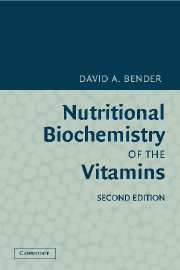Book contents
- Frontmatter
- Contents
- List of Figures
- List of Tables
- Preface
- 1 The Vitamins
- 2 Vitamin A: Retinoids and Carotenoids
- 3 Vitamin D
- 4 Vitamin E: Tocopherols and Tocotrienols
- 5 Vitamin K
- 6 Vitamin B1 – Thiamin
- 7 Vitamin B2 – Riboflavin
- 8 Niacin
- 9 Vitamin B6
- 10 Folate and Other Pterins and Vitamin B12
- 11 Biotin (Vitamin H)
- 12 Pantothenic Acid
- 13 Vitamin C (Ascorbic Acid)
- 14 Marginal Compounds and Phytonutrients
- Bibliography
- Index
9 - Vitamin B6
Published online by Cambridge University Press: 03 December 2009
- Frontmatter
- Contents
- List of Figures
- List of Tables
- Preface
- 1 The Vitamins
- 2 Vitamin A: Retinoids and Carotenoids
- 3 Vitamin D
- 4 Vitamin E: Tocopherols and Tocotrienols
- 5 Vitamin K
- 6 Vitamin B1 – Thiamin
- 7 Vitamin B2 – Riboflavin
- 8 Niacin
- 9 Vitamin B6
- 10 Folate and Other Pterins and Vitamin B12
- 11 Biotin (Vitamin H)
- 12 Pantothenic Acid
- 13 Vitamin C (Ascorbic Acid)
- 14 Marginal Compounds and Phytonutrients
- Bibliography
- Index
Summary
Vitamin B6 has a central role in the metabolism of amino acids: in transaminase reactions (and hence the interconversion and catabolism of amino acids and the synthesis of nonessential amino acids), in decarboxylation to yield biologically active amines, and in a variety of elimination and replacement reactions. It is also the cofactor for glycogen phosphorylase and a variety of other enzymes. In addition, pyridoxal phosphate, the metabolically active vitamer, has a role in the modulation of steroid hormone action and the regulation of gene expression.
The vitamin is widely distributed in foods, and clinical deficiency is virtually unknown, apart from an outbreak during the 1950s, which resulted from overheating of infant milk formula.
Marginal inadequacy, affecting amino acid metabolism and possibly also steroid hormone responsiveness, may be relatively common. A number of vitamin B6 dependency syndromes have been reported – inborn errors of metabolism in which the defect is in the coenzyme binding site of the affected enzyme.
Estrogens cause abnormalities of tryptophan metabolism that resemble those seen in vitamin B6 deficiency, and the vitamin is widely used to treat the side effects of estrogen administration and estrogen-associated symptoms of the premenstrual syndrome, although there is little evidence of its efficacy. High doses of the vitamin, of the order of 100 times requirements, cause peripheral sensory neuropathy.
In a number of enzymes that catalyze reactions that might be assumed to be pyridoxal phosphate-dependent, pyruvate provides the reactive carbonyl group (Section 9.8.1). Other enzymes have reactive carbonyl groups provided by a variety of quinones.
- Type
- Chapter
- Information
- Nutritional Biochemistry of the Vitamins , pp. 232 - 269Publisher: Cambridge University PressPrint publication year: 2003
- 5
- Cited by



